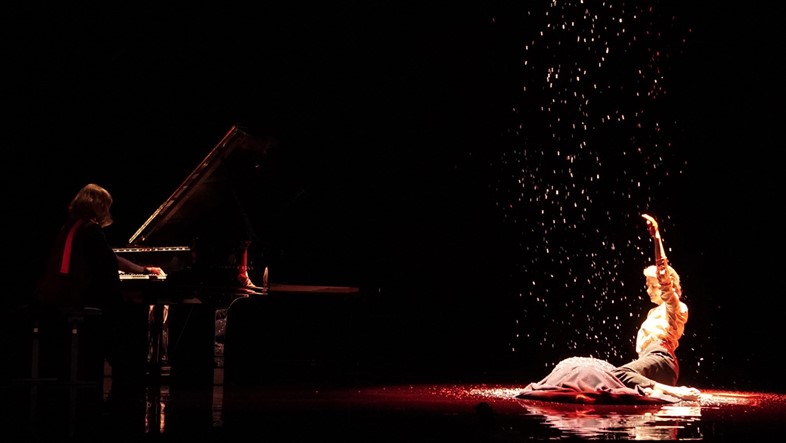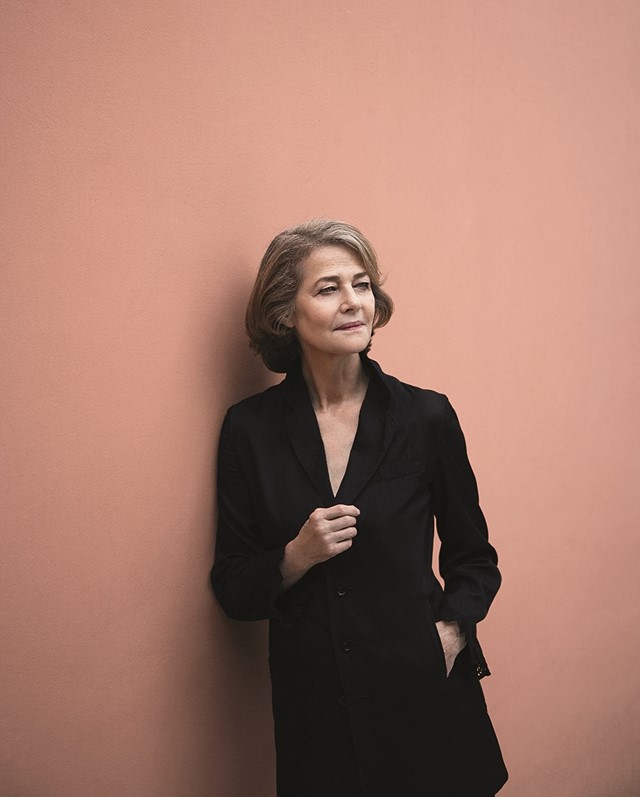On the first night of her performance at Manchester International Festival, we sit down with the veteran actress to talk the collision of theatre and art
Who’s afraid of the big bad wolf? We all are, it seems. Despite being hunted to extinction in the wilds of the UK, and becoming increasingly rare around the world, the wolf remains a fearful cultural spectre; the predatory outsider, the child-eating malevolent of fairy tales, the werewolf that reveals the uncontrollable dark side of the human psyche. From Aesop to Dante to Tolkien, the wolf has been cast as the villain of the piece, and it hasn’t helped its own press with all that signature slinking in the shadows and murderous attacks on livestock and people. But the wolf has its champions, foremost among them a collection of creative luminaries who have come together for the Manchester International Festival to create a new lupine paradigm for the modern world.
“When you bring contemporary art into theatre, then you will find surprising things”
Neck of the Woods was the brainchild of acclaimed pianist and wolf conservationist Hélène Grimaud and Turner prize-winning artist Douglas Gordon – who has three stuffed wolves in his studio. “He’s honouring them in a certain way,” Grimaud told the Guardian. “In a Douglas Gordon sort of way.” Together they have sculpted a many-textured retelling of Little Red Riding Hood, enlisting Mexican writer Veronica Gonzalez Peña to create the script and actress Charlotte Rampling to narrate. The resulting piece will debut today, a fluid tapestry of art, sound, music, voice and visuals that has unique resonance for each participant. For Rampling, as well as being an exploration of a new type of performance, it is a demonstration of her curiosity and courage as an actor and storyteller. So, in advance of Neck of the Woods’ first show, we talked to Rampling about working with wolves, the power of the audience and what she means when she calls herself an artist.

Charlotte Rampling on Neck of the Woods…
“It is very much like a voyage of discovery, you don’t know where you are going to get or where you are going to go. It is a work in process as we are going along, as we start to discover things, which is incredibly intriguing. With the conceptual stuff you don’t know what form it is going to take, it can morph into almost anything. Most conceptual artists don’t know how and what it will morph into. So when Douglas had this idea I was thinking, ‘will I actually know anything about it?’ I was continuously thinking about where everything would be going. He told me that I would know a lot when we started, that we would have a text but we would beat it up and mix it up, do it our own way. We didn’t exactly want a chronological text but at the same time it might turn out that way, the possibilities are very large and this is something that I enjoy. This is not my world, even though film can be quite improvised there is still a structure in the film world and theatre world. But when you bring contemporary art into theatre, then you will find surprising things.”
“The audience are like a pack of wolves and they will take the play away from you if you are not careful”
Charlotte Rampling on the wolf…
“I think humans have a very profound relationship with animals. Wild creatures are more mysterious to us – we can’t actually approach them so that makes them enigmatic, that’s why we study them and do art pieces around them. There is a lot that goes in people’s imagination about wolves, starting from the basic stories we hear all the time. There is a particular fascination – from the thought that one must be scared or wary of them, to the cultural idea of ‘the big bad wolf’. They have a strange character, they are mysterious, maybe more so than other animals.”
Charlotte Rampling on the power of the audience…
“The study of an audience is very important. We are doing it for them so we want to get the best possible angle for them, and to bring them in. You feel when an audience is getting distracted or not quite following, and then you have to really start to understand why they are not with you. Yes, I think that is what live performance is about; you are facing an audience and you are saying it to them. It is not like you are in a play and playing to the people you are playing with; here you are playing to the audience so you must have them with you at all times. If you don’t – well, they are like a pack of wolves and they will take the play away from you if you are not careful. They will turn it into something other. If you let the audience go, you have lost the moment, and essentially you have lost the play.”
“All my life I have followed the thought that if I have already done something, why would I then want to do it again?”
Charlotte Rampling on being an artist…
“All my life I have followed the thought that if I have already done something, why would I then want to do it again? So unless the film is really intriguing then to me, it is just another film. I have always gone off the track and have looked at things that I can do that will allow me to see the world in a different way. It is just a basic form of curiosity on my part, to want to discover something and find another way of doing things. What I found is that as you get older your mind actually doesn’t get any older, you just get older physically and you obviously have more experience. Now that I am working with a lot of younger artists, it is very intriguing, as I am able to bring my life with me to the stage. There is a young French artist I am working with called Loris Gréaud. We did a film together with David Lynch called The Snorks, which was an extraordinary project based around animals that live so far underneath the sea that no one has ever seen them and they let out energy through electrics. The relationships that you have with other artists after you have done all these projects brings you into another world, and to me that is what living creatively is all about. I am not an artist per se even though I would love to be, I don’t do sculptures or the like as that is not my profession but I know that I can infiltrate what I have into the works of others.”
Neck of the Woods is at HOME, Manchester, as part of the Manchester International Festival until July 18.
